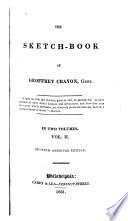Quotes from book
The Sketch Book of Geoffrey Crayon, Gent.

The Sketch Book of Geoffrey Crayon, Gent., commonly referred to as The Sketch Book, is a collection of 34 essays and short stories written by the American author Washington Irving. It was published serially throughout 1819 and 1820. The collection includes two of Irving's best-known stories, attributed to the fictional Dutch historian Diedrich Knickerbocker: "The Legend of Sleepy Hollow" and "Rip Van Winkle". It also marks Irving's first use of the pseudonym Geoffrey Crayon, which he would continue to employ throughout his literary career.

"Philip of Pokanoket : An Indian Memoir".
A more extensive statement not found as such in this work is attributed to Irving in Elbert Hubbard's Scrap Book (1923) edited by Roycroft Shop:
The Sketch Book of Geoffrey Crayon (1819–1820)
Variant: Little minds are tamed and subdued by misfortune; but great minds rise above it.

“That happy age when a man can be idle with impunity.”
"Rip Van Winkle".
The Sketch Book of Geoffrey Crayon (1819–1820)

“They who drink beer will think beer.”
"Stratford-on-Avon".
The Sketch Book of Geoffrey Crayon (1819–1820)

"The Mutabilities of Literature".
The Sketch Book of Geoffrey Crayon (1819–1820)
Context: Language gradually varies, and with it fade away the writings of authors who have flourished their allotted time; otherwise, the creative powers of genius would overstock the world, and the mind would be completely bewildered in the endless mazes of literature. Formerly there were some restraints on this excessive multiplication. Works had to be transcribed by hand, which was a slow and laborious operation; they were written either on parchment, which was expensive, so that one work was often erased to make way for another; or on papyrus, which was fragile and extremely perishable. Authorship was a limited and unprofitable craft, pursued chiefly by monks in the leisure and solitude of their cloisters. The accumulation of manuscripts was slow and costly, and confined almost entirely to monasteries. To these circumstances it may, in some measure, be owing that we have not been inundated by the intellect of antiquity; that the fountains of thought have not been broken up, and modern genius drowned in the deluge. But the inventions of paper and the press have put an end to all these restraints. They have made everyone a writer, and enabled every mind to pour itself into print, and diffuse itself over the whole intellectual world. The consequences are alarming. The stream of literature has swollen into a torrent — augmented into a river — expanded into a sea.

"The Mutabilities of Literature".
The Sketch Book of Geoffrey Crayon (1819–1820)
Context: There rise authors now and then, who seem proof against the mutability of language, because they have rooted themselves in the unchanging principles of human nature. They are like gigantic trees that we sometimes see on the banks of a stream; which, by their vast and deep roots, penetrating through the mere surface, and laying hold on the very foundations of the earth, preserve the soil around them from being swept away by the ever-flowing current, and hold up many a neighboring plant, and perhaps worthless weed, to perpetuity.